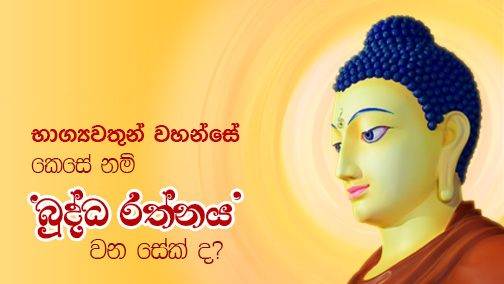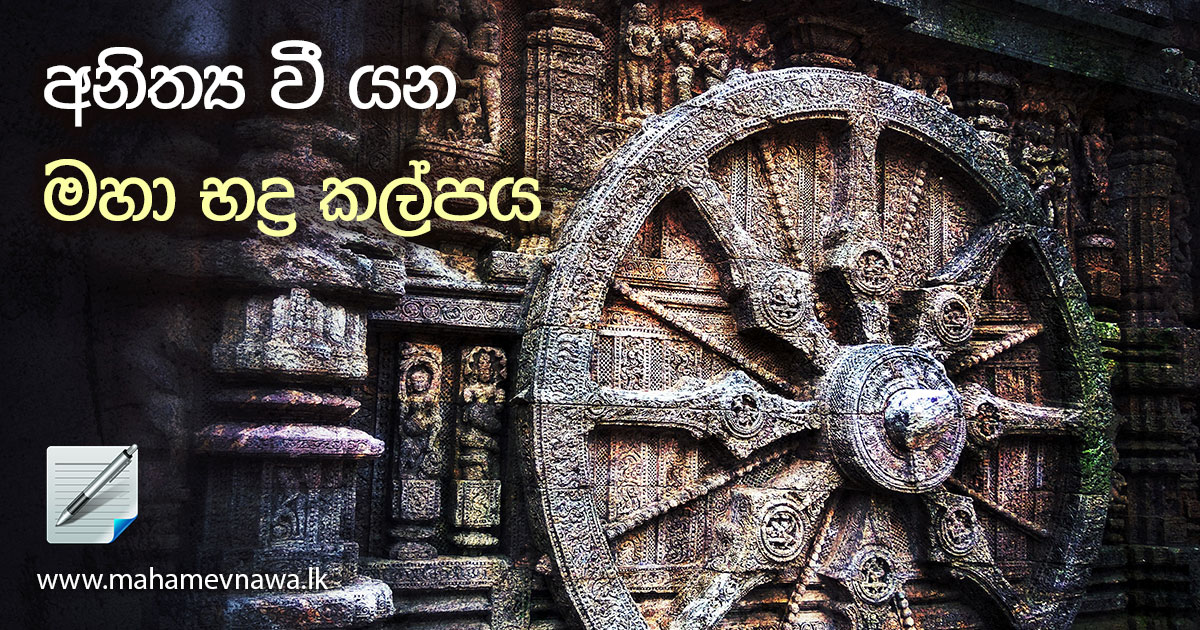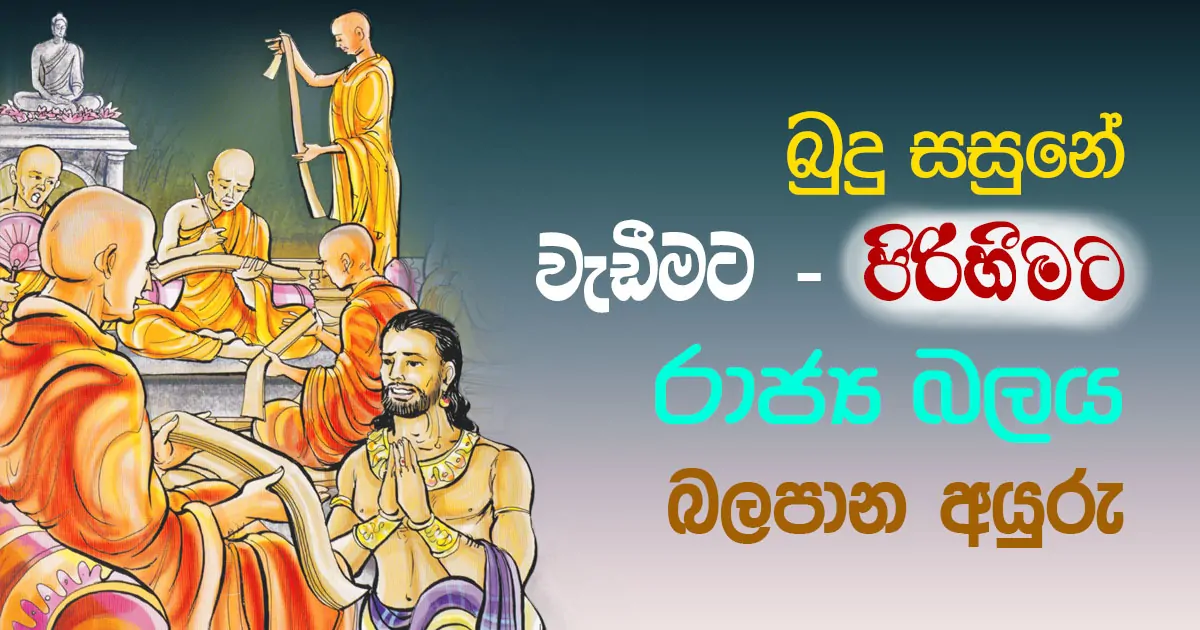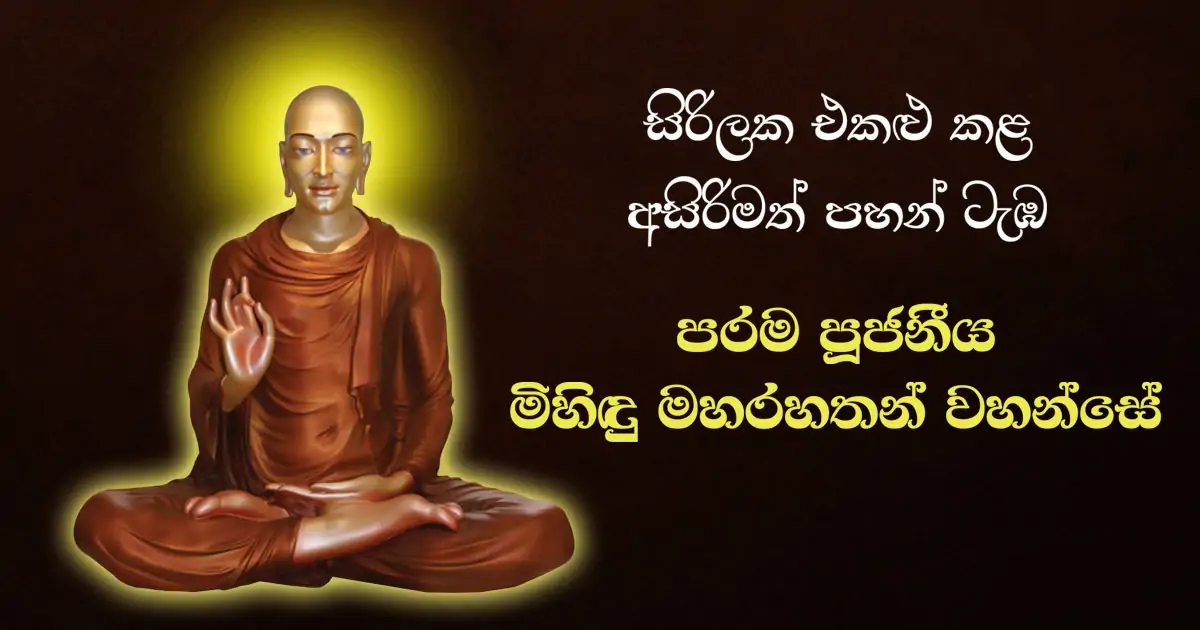“Chēthanāhan Bhikkhavē kamman vadāmi. Chēthayithvā kamman karōthi kāyēna vāchāya manasā”
“Dear Bhikkhu, I see intention as the Karma. One does Karma by body, words, and mind based on an intention.”(Nibbēdhika Sutta – A.N. 6th Nipātha)
Karma or intention occurs as a result of contact, which is expounded as the bringing internal and external faculties together by the intervention of Viññānaya (explicit recognition). For an example, Viññānaya in the eyes (Chakkhu Viññānaya) arises because of eyes (internal) and figures (external); and the collection of these three is the contact in the eye. This contact that occurs in eyes is called Roopa Sanchētanā, which is the occurrence of intention based on the figure seen by the eyes. As a result of that, deeds are done from mind, body, and words. Thus the Karma occurs in such background.
Beings of the world live and act like servants of Karma. They are bound to Karma in a way so they cannot get rid of it; it’s like a cart wheel tightly fastened by an iron pin. It is so influential such that it is okay to say that Karma is the governing power of one’s comfort and suffering.
“Dear Monks, these beings live having Karma as what they own. They live inheriting the Karma, making it the birth place, and making it their relative. The Karma is their refuge. If a friendly or evil karma is performed, that Karma will be his inheritance.”
(Sansappanii Pariyāya Sutta – A.N. 10th Nipātha)
The Supreme Buddha showed how the beings are born in worlds with pleasures and sufferings according to their own Karma.
“Dear Lord King, it’s like this. Let’s say there’s a multi-floor mansion in a junction. A person in a top floor looks at the ground. He then sees all the people that come in the house and going out from it. He also sees the people who walk in the streets. People who are sitting on the ground at the center of the junction are also seen by him. Then he gets this idea: ‘these people come in the house and go out from the house. These people walk in the streets. Some people are sitting on the ground in the center of the junction.’
Dear Lord King, in a similar way when a Bhikkhu’s mind is tranquil, cleansed, brightened, free of obstacles, free of blemishes (Upaklēsha), softened, suitable for cultivation, and unalterable, he focuses his mind to realize the passing-away and birth of beings. He bends his mind to it.
Then that Bhikkhu sees beings from a supernatural eye, which excels regular eye-sight of humans. He sees beings that are passing-away and being born. He gains the knowledge of all beings that are being born in low, high, colorful, and dreary forms and in upper-level and low-level worlds according to their Karma. ‘Oh, these beings’ actions were evil, words were evil, and thoughts were evil. They treated meritorious monks evilly. They were with false views and acted upon them. These beings are now born in hell after their deaths.But these meritorious beings had virtuous actions, virtuous words, and virtuous thoughts. They didn’t treat meritorious monks in evil manner. They had righteous views and acted upon them. These beings are now born in divine worlds.’ Thus the Bhikkhu sees these beings with his supernatural eye, which is beyond the regular eye-sight of humans. He sees beings that are passing-away and being born. He gains the knowledge of all beings that are being born in low, high, colorful, and dreary forms and in upper-level and low-level worlds according to their Karma.
(Sāmññphala Sutta – Deegha Nikaya)
It is obvious from this that the beings are born in either divine worlds or hell and be comfortable or suffer based on their own Karma. This also seems to be a subject for great human beings who developed their minds. This wisdom of seeing other beings’ passing-away and birth (Chuthūpapātha Gnāna) was attained by Bhikkhus, who were able to attain the fourth state of contemplation (jhāna) by developing their concentration, in the time of the Supreme Buddha. Most people think that they can trick their Karma as they wish. But see the following description of Karma delivered by the Supreme Buddha with His great wisdom of disclosing hidden things.
“Dear Monks, I don’t say outcomes of Karma one is accumulated intentionally going to be end without being facing them. The person might be visited by those outcomes in this life, the next life, or in any other future life, as long as that person is born again. Therefore, ‘dear monks, I don’t say consequences of Karma one is accumulated intentionally going to be end without being facing them.’
In this regard, dear monks, there are three types of bodily actions that are done with evil thoughts (consentience). The outcome of these actions is suffering. There are four types of actions relate to words that are done with evil thoughts (consentience). These also cause suffering. There are three types of actions relate to mind that are done with evil thoughts (consentience). These also cause suffering.”
(Pathama Sanchethanika Sutta – A. N. 6)
Killing beings, stealing, and adulteration belong to defilements related to bodily actions. Lying, divulge secrets, communicating harsh words, and communicating vacuous words belong to defilements related to words. The three evil deeds related to mind are desire to have others belongings, ill will, and false view.
The Supreme Buddha showed the good side of these actions carried out by body, words, and mind in the same discourse as follows:
“In this regard Dear Monks, there are three good bodily actions governed by meritorious consentience that bring good fortune to a person. These cause pleasure. Good deeds with respect to good words caused by meritorious consentience are of four kinds that bring a person a good fortune. These cause pleasure. There are three types of mental actions that govern by meritorious thoughts bringing a fortune to a person. These cause pleasure to a person.”
(Pathama Sanchethanika Sutta – A. N. 6)
That is, refraining oneself from killing beings, stealing, and adulteration belong to meritorious bodily actions. Refraining from lying, divulging secrets, communicating harsh words, and communicating vacuous words belong to meritorious words. The three meritorious deeds related to mind are abstaining from desiring to have others belongings and ill will and having correct view (Sammā Ditthi).
It goes with life like a seed planted in the ground. This is how the Supreme Buddha saw that.
“Dear Monks, if a person with the Sammā Ditthi has a bodily action, an action with respect to words, an action with respect to mind, an intention, an existence, an aim, and Karma (Sanskāra) that cause effects according to his view, all these will result in fulfilled, as desired, and pleasurable things. What is the reason for that? Dear Monks, that view is pleasant. Dear Monks, it is like this: let’s think that a seed of sugar cane or hill rice or grape was planted in a wet ground. If these seeds grow well by drawing nutrition and water from the earth, all these will result in sweet and tasty products. What’s the reason for that? Dear Monks, it’s because it was a pleasant seed.”
(A. N. 3rd Nipatha)
When a person of false views is performing a Karma based on that opinion what exists is a process of an evil seed. See the following preaching.
“Dear Monks, if a person with the false view has a bodily action, an action with respect to word, an action with respect to mind, an intention, an existence, an aim, and Karma (Sanskāra) that causes effects according to his view, all these will result in frustrated, unexpected, unwanted, and unhappy things. What is the reason for that? Dear Monks, that view is evil. Dear Monks, it is like this: let’s think that a seed of wormwood or bitter papaya was planted in a wet ground. If these seeds grow well by drawing nutrition and water from the earth, all these will result in bitter, harsh, and unpleasant product. What’s the reason for that? Dear Monks, it’s because it was an evil seed.”
(A. N. 3rd Nipatha)
Having such nature in the Karma, see how helpful it is to have deeds full of merits when one goes to a birth as a result of one’s own Karma. Please read the following preaching:
“Dear Monks, let’s say someone donates things like foods, drinks, cloths, seats, flowers, scents, and houses to monks (ones who attempt to free from defilements). He likes to get things that he donates as a result of that good deed. He heard something like this: ‘Deities who live in the divine world called Chāthummahārājika have long lifespans. They have great pleasures.’ Then he feels this way: ‘I would also like to get a birth in Chāthummahārājika divine world after my death here.’ He then focuses his mind on to that expectation. He develops that mind. Because he focused his mind to this this crude sensual world again, his mind will take him to a birth in the Chāthummahārājika divine world after his death. Even this kind of birth is only for a virtuous person and not for an impure person. Dear Monks, the virtuous person’s hope will be fulfilled because of his pureness.”
(Dānupatti Sutta – A. N. 6)
This shows that a person’s birth completely depends on the nature of that person’s mind. If that mind becomes corrupted, he/she will have to be born in the great hell (Niraya).
“Dear Monks, I am looking at a mind of a person who has a corrupted mind. If he is to die right now, he will be born in the great hell (Niraya) like the way a person puts away a heavy weight from his shoulders. What is the reason for that? Dear Monks, it’s because his mind is tainted. Dear Monks, some beings die and get births in hells (low-level worlds or Vinipātha) because their minds are contaminated.
Dear Monks, I am looking at a mind of a person who has a pleasant (not corrupted) mind. If he is to die right now, he will be born in upper-level worlds (among divine beings) like the way a person puts away a heavy weight from his shoulders. What is the reason for that? Dear Monks, it’s because his mind is pleasant. Dear Monks, some beings die and get births in the divine worlds because their minds are pleasant.”
(A. N. 1st Nipātha)
When someone is born, what that person gets is the six faculties: eyes, ears, a nose, a tongue, a body, and a mind. This is completely a result of his/her Karma. From these faculties, one has to feel comfort or face suffering according to that person’s Karma. See the following teaching of the Supreme Buddha about this matter.
“Dear Monks, what does it mean by an old Karma? Dear Monks, eye is an old Karma, an especially formed thing, an intentionally formed thing, and a thing that is perceived by sensation. Ear is an old Karma, an especially formed thing, an intentionally formed thing, and a thing that is perceived by sensation. Nose is an old Karma, an especially formed thing, an intentionally formed thing, and a thing that is perceived by sensation. Tongue is an old Karma, an especially formed thing, an intentionally formed thing, and a thing that is perceived by sensation. Body is an old Karma, an especially formed thing, an intentionally formed thing, and a thing that is perceived by sensation. Mind is an old Karma, an especially formed thing, an intentionally formed thing, and a thing that is perceived by sensation. Dear Monks, this is what is called an old Karma.”
(Kamma Sutta – S. N. 4)
Can’t we free from this Karma? Is Karma an eternal thing? No, we can indeed free ourselves from Karma. Karma is a non-eternal thing. It is a thing that comes to an end. The Supreme Buddha taught us in the following way:
“Dear Monks, what does it mean by freeing oneself from the Karma? The touching of the freedom by freeing oneself from the Karma done by body, words, and mind is known as the freeing from Karma.
Dear Monks, what is the path to free from Karma? It is the Eight Noble Path: Sammā Ditthi, Sammā Sankappa, Sammā Vāchā, Sammā Kammantha, Sammā Aajeeva, Sammā Vāyāma, Sammā Sathi, and Sammā Samādhi. Dear Monks, this is called the path of freeing oneself from the Karma.”
(Kamma Sutta – S. N. 4)
The subject of outcomes of Karma is infinite. Only a Buddha has the ability to comprehend it. Furthermore, one could only learn about it, at least up to a certain level, only in an era of a Buddha. Also, one will only be able to free oneself from Karma in a Buddha’s time by following the Eight Noble Path.
– Ven. Kiribathgoda Gnanananda Thero







